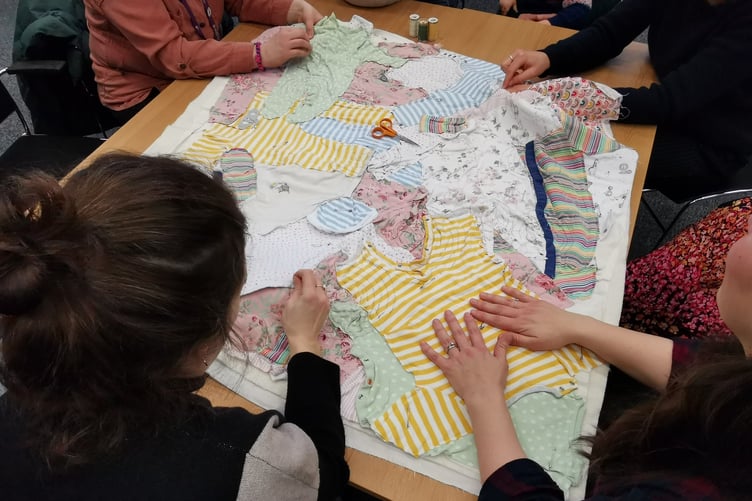Mothers have been sewing a quilt to encourage discussions about the infant feeding choices they make, as part of an Aberystwyth University academic’s project.
Dr Gillian McFadyen is one of the researchers leading the Motherhood Quilt and Guilt project, in collaboration with academics from Swansea and Northumbria Universities.
The innovative project invited mothers to submit a voice recording re-counting their experiences of feeding their babies, and to donate an outgrown babygro which could be stitched into the quilt.
Community workshops were then held in Aberystwyth and Swansea which gave local mothers the opportunity to get together to share their experiences of motherhood and infant feeding whilst stitching the quilt.
The completed quilt will incorporate digital sensors which will allow people to hear audio clips from mothers about their feeding journey.
Aberystwyth University International Politics lecturer, Dr McFadyen, researches the use of political embroidery as a method of resistance, memory, activism and storytelling. She explains:
“The emotive and often divisive subject of how mothers feed their babies is a regular topic of discussion among policymakers, academics, mothers, and the public. The uniqueness of the Motherhood Quilt and Guilt is that it departs from dominant breastfeeding literature that tends to focus on positive emotions related to bonding, and offers space for amplifying mothers’ voices and their range of experiences surrounding feeding.
“The project follows in the Welsh communal quilting tradition, as through the stitching workshops we create a space for mothers to come together and share their stories whilst sewing.”
Dr Sophia Komninou, Lecturer of Public Health Nutrition at Swansea University, is collaborating on the project, which was funded by Welsh Crucible. She said:
“Through previous research we discovered that, regardless of how mothers feed their babies, they all harbour feelings of guilt. For those that formula feed or combination feed, there are often feelings of having failed to follow public health advice, especially if, before they had the baby, they were planning to breastfeed. However, those mothers that breastfeed also often feel that they are letting people down - for example, they feel guilty that breastfeeding takes them away from their other children, makes them a less attentive partner, and means that they focus less on their career.”
Fellow collaborator, Dr Angelika Strohmayer, Assistant Professor in the School of Design at Northumbria University, is interested in collaborative craft practices and digitally-augmented craft. She said:
“Within the quilt, we are incorporating a number of quilted spirals, using a traditional motif. The pattern guides people to interact with the hidden touch sensors and simultaneously can also be seen as a metaphor for the spiralling emotions experienced by mothers. At the centre of each spiral, we are embedding an electronic touch sensor through which a mother’s story can be heard through a pre-recorded audio clip.”
When it is completed, the project team plan to exhibit the digital quilt in venues across Wales to encourage public discussion, empathy and understanding of infant feeding choices, and the complex emotional experiences of motherhood.


-with-her-son-Rufus-her-partner-and-younger-son-Noah.jpeg?width=209&height=140&crop=209:145,smart&quality=75)


Comments
This article has no comments yet. Be the first to leave a comment.